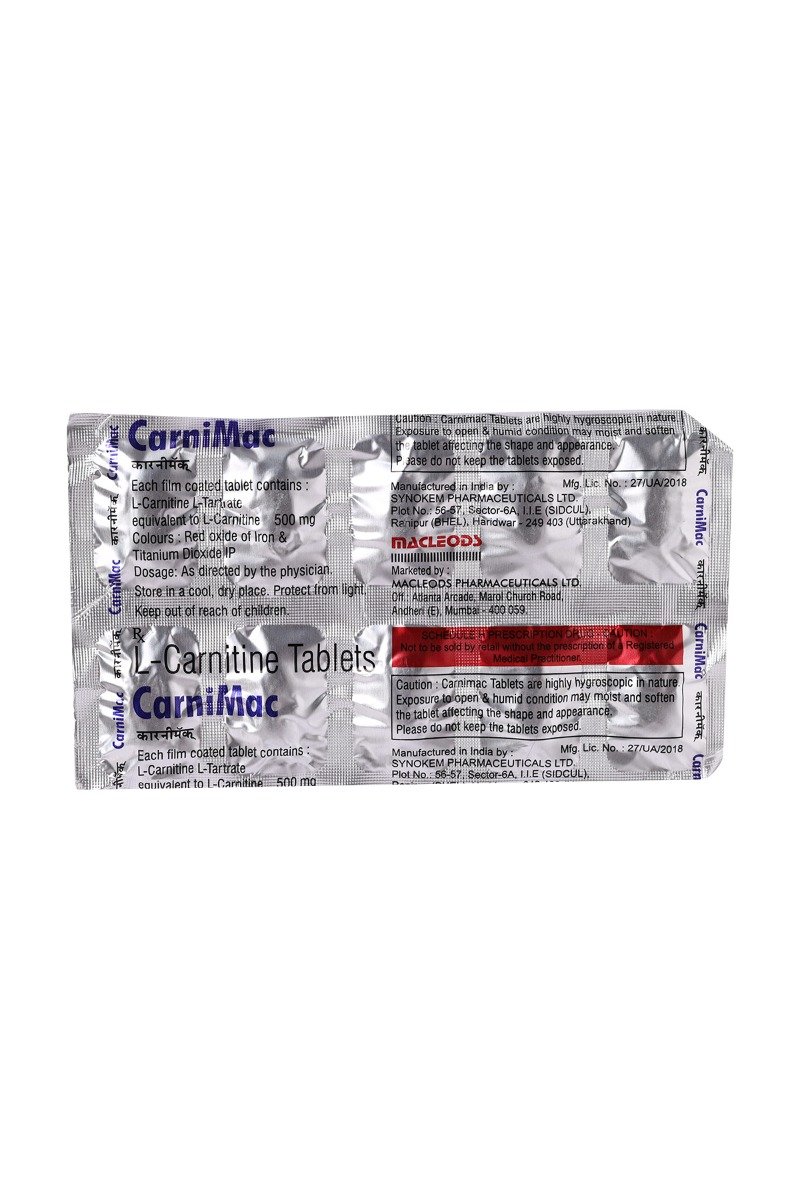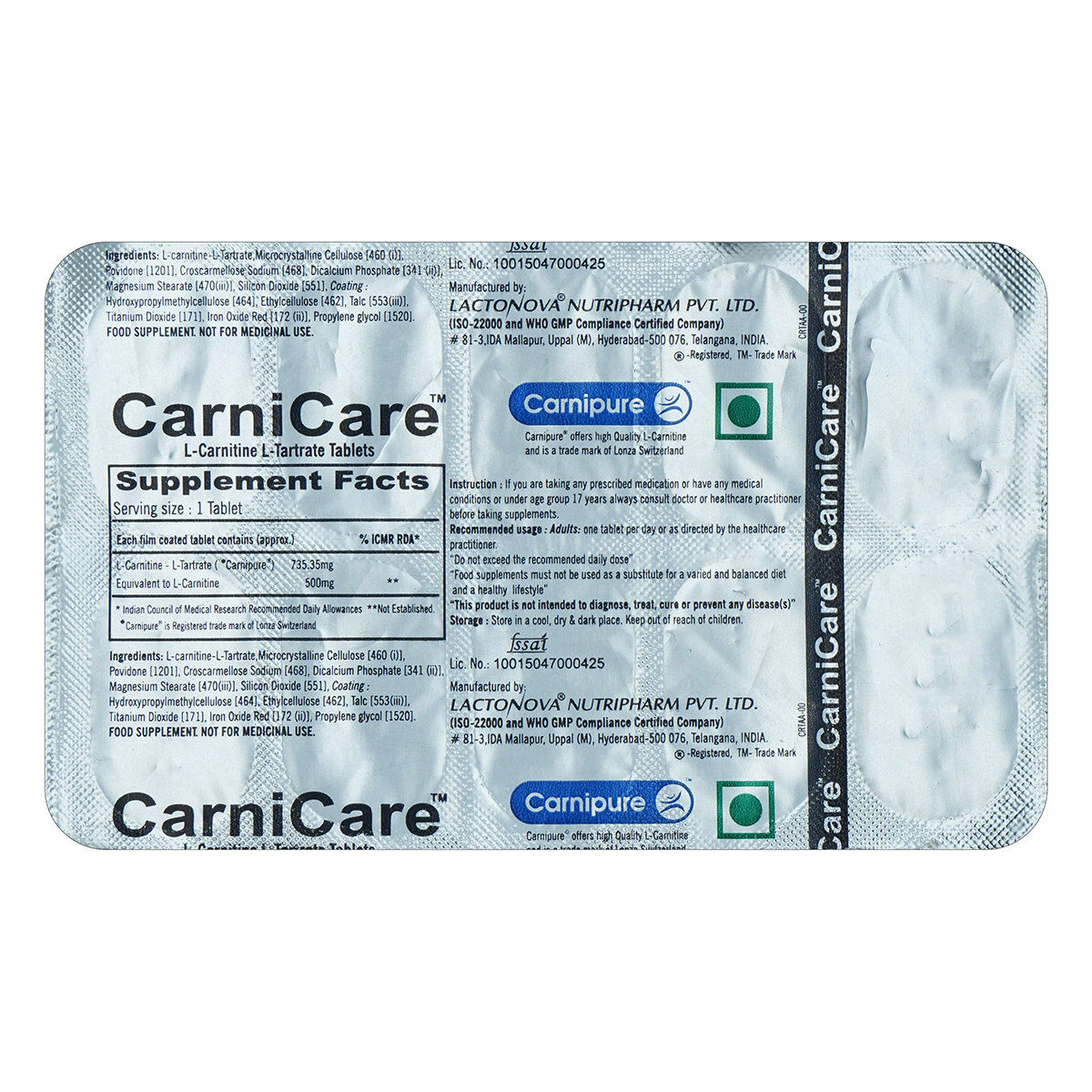L Carnitine
About L Carnitine
L Carnitine belongs to the class of 'nutraceutical products', primarily used to treat carnitine deficiency. Carnitine deficiency is a metabolic muscle disease caused by low levels of carnitine. Carnitine is an amino acid that helps in the production of energy from fatty acids. Symptoms of carnitine deficiency include weakness in the muscles of hips, shoulders, upper arms and legs, low blood sugar, fatigue, vomiting, abdominal pain, growth retardation and low weight.
L Carnitine contains L-Carnitine or Levo-carnitine, a naturally occurring derivative of the amino acids, lysine and methionine. When taken as a supplement, the body converts L-Carnitine into acetyl-L-carnitine and propionyl-L-carnitine. These products further help the body to produce energy from fat.
Your doctor will decide the dosage based on your medical condition. Sometimes, L Carnitine may have common side effects like stomach pain, nausea, vomiting, and diarrhoea. These side effects do not require medical attention and gradually resolve over time. However, if these side effects persist for a longer time, please seek medical advice.
Let your doctor know if you are using prescription, non-prescription drugs and herbal products before starting L Carnitine. If you are known to be allergic to L Carnitine or its inactive components, please inform your doctor. Please tell your doctor if you have an underactive thyroid (hypothyroidism), liver or kidney diseases, diabetes, fits, and dialysis treatment. If you are a pregnant or breastfeeding mother, please consult your doctor before taking L Carnitine. L Carnitine is not recommended for children under 12 years of age.
Uses of L Carnitine
Medicinal Benefits
L Carnitine is used to treat primary and secondary carnitine deficiency. It contains L-Carnitine or Levo-carnitine, a naturally occurring derivative obtained from amino acids, lysine and methionine. When the body lacks the carnitine, L Carnitine helps in replacing those low levels. L Carnitine is further converted into acetyl-L-carnitine and propionyl-L-carnitine in the body. These products further help the body to produce energy from fat. L Carnitine also plays a role as a water-soluble vitamin, antilipemic drug (lowers blood cholesterol), and a nootropic agent (improve cognitive function).
Directions for Use
Storage
Side Effects of L Carnitine
- Stomach pain
- Nausea
- Vomiting
- Diarrhoea
Drug Warnings
Let your doctor know if you are using prescription, non-prescription drugs, and herbal products before starting L Carnitine. Inform your doctor if you are allergic to L Carnitine or its inactive components. Please inform your doctor if you have underactive thyroid (hypothyroidism), liver or kidney diseases, diabetes, and fits. Inform your doctor if you need to undergo dialysis treatment before starting L Carnitine. Pregnant or breastfeeding women should consult their doctor before taking L Carnitine. Keep L Carnitine away from direct sunlight. Do not store L Carnitine above 25°C and keep it away from direct sunlight.
Drug Interactions
Drug-Drug Interaction: L Carnitine may interact with blood thinners (warfarin, acenocoumarol).
Drug-Food Interaction: No interactions found/established.
Drug-Disease Interaction: Use L Carnitine with medical advice if you have an underactive thyroid (hypothyroidism), liver or kidney diseases, diabetes, fits, and allergic reactions to medicines.
Drug-Drug Interactions Checker List:
Safety Advice

Alcohol
cautionIt is advised to limit the alcohol intake while using L Carnitine.

Pregnancy
cautionL Carnitine should be used only when recommended by your doctor during pregnancy. Let your doctor know if you are pregnant or planning to conceive before taking L Carnitine.

Breast Feeding
cautionIt is not known if L Carnitine is excreted into breast milk. Please consult your doctor before taking L Carnitine if you are breastfeeding.

Driving
safe if prescribedNo interaction found/established.

Liver
cautionLet your doctor know if you have any history of liver diseases before taking L Carnitine. Dose adjustment may be required.

Kidney
cautionLet your doctor know if you have any history of kidney diseases before taking L Carnitine. Dose adjustment may be required.

Children
unsafeL Carnitine is not recommended for children below 12 years of age.
Habit Forming
Diet & Lifestyle Advise
- Try food sources like milk, cheese, eggs, liver and kidney, chicken, red meat, tuna, mackerel, and salmon, shellfish, oysters, clams, dark green vegetables, such as spinach and kale, beets, avocados, and potatoes, whole grains, cereals, kidney beans, black beans, and chickpea.
- Include fruits like citrus, banana, and watermelon in your diet.
- Avoid smoking and alcohol consumption.
- Exercise regularly and maintain a healthy lifestyle.
- Avoid excess fatty foods.
Special Advise
Let your doctor and the laboratory staff know if you are using L Carnitine since it may interfere with laboratory tests.
Patients Concern
Disease/Condition Glossary
Carnitine deficiency is a metabolic muscle disease caused by low levels of carnitine. Carnitine is an amino acid that helps in the production of energy from fatty acids. Carnitine deficiency can be primary and secondary. Primary carnitine deficiency occurs due to a genetic mutation in the substance responsible for bringing the carnitine into the cells. Secondary carnitine deficiency occurs when there is not enough carnitine in the blood. Symptoms of carnitine deficiency include weakness in the muscles of hips, shoulders, upper arms, and legs, low blood sugar, fatigue, vomiting, abdominal pain, growth retardation, and low weight.
FAQs
L Carnitine is a dietary supplement that contains L-Carnitine, a type of protein. It works by replacing the carnitine levels in the body, thus treating carnitine deficiency. L Carnitine also plays a role as a water-soluble vitamin, antilipemic drug (lowers blood cholesterol), and a nootropic agent (improve cognitive function).
It is important to tell your doctor if you have an underactive thyroid (hypothyroidism), liver or kidney diseases, diabetes, fits, and dialysis treatment. Let your doctor know if you have any other medical concerns before starting L Carnitine.
L Carnitine works best when you take it with a meal or within 30 minutes after a meal. For more information, please consult your doctor.
If you miss a dose, take it as soon as you remember. However, if it is time for the next scheduled dose, skip the missed dose and follow your usual dosage.







